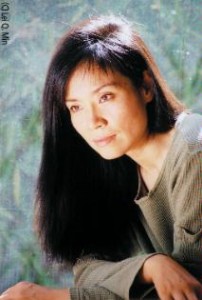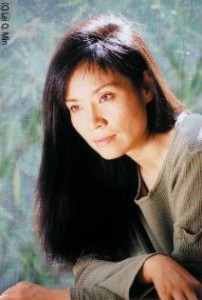 By Jae-Ha Kim
By Jae-Ha Kim
Chicago Sun-Times
June 25, 1995
When Anchee Min wanted to attend the School of the Art Institute in 1984, a friend who knew English filled out her application forms, marking off “excellent” under the category for “English language skills.”
When Min arrived in Chicago to begin classes, it quickly became apparent to the school’s administrators that she spoke virtually no English. She was told to come back when she had learned enough to understand classes.
Six months later, Min was a student there.
That she is a quick study is obvious, but what’s astonishing is the confident command of English Min exhibits in her best-selling 1994 autobiography Red Azalea (Pantheon, $22) and her current novel Katherine (Riverhead; Putnam, $22.95). Of course, she’s quick to point out, it did take six years to complete Red Azalea.
Katherine is a novel about Chinese students who are fascinated by a confident, young American woman who has come to China to teach English. Yet Min said it is in many ways as autobiographical as her heart-wrenching debut, Red Azalea, in which she chronicled her life from Shanghai, China, to Chicago, from working in a labor camp to becoming the star of Madame Mao’s “revolutionary model operas” and from being a member of the Red Guard to becoming a student at the School of the Art Institute.
Wearing a black shirt, black leggings and platform sandals, Min, 38, spoke with Showcase during a recent promotional visit to Chicago, where she lived for 10 years before moving to Torrance, Calif., with her 3-year-old daughter Lauryan. She hasn’t gone Hollywood, though Hollywood is interested in turning her books into films.
Q. Why the move to the West Coast?
Min: I moved because of my divorce and because California is closer to China. Not so much in distance, but it is psychologically closer for me. My mother had a stroke and my father has cancer, so I llike being able to go back and visit them.
Q. How difficult was it for you to write these books in English?
Min: It was hard. I spent a lot of time on them, but what drove me was my memory of these events. I was so driven because I had so much to say and writing was just a vehicle to get my feelings out. I lived through these events so I didn’t really have to worry about plots. The hard part was to be honest and overcome this Chinese shame of exposing private things.
Q. Was there a point when you just wanted to forget about your past rather than try to remember it?
Min: Yes. I wanted to forget about all the horrible experiences but I couldn’t escape them. So writing in private became very therapeutic. The stories I’m telling are not just my own personal stories, but the stories of a billion people. In America, people are nice and tend to believe that evil will not win. But from my life experiences, I see that evil wins all the time if we don’t fight it. We have to learn the lesson of human tragedy.
Q. You were a film star in China. How did that come about?
Min: Madame Mao had selected me to be the model of proletarian beauty in a film of her opera, “Red Azalea.” My neighbors would wait for me to come home so they could look at me, and they would say that I was not pretty and that my sister should be the movie star. But you see, that is what Madame Mao wanted – she wanted someone to represent ordinary people. When Mao Tse-tung died, Madame Mao was accused of killing her husband and I was demoted to janitor.
Q. Does your friendship with actress Joan Chen (who helped Min get out of China) stem from back then?
Min: Yes, we became friends when she was a teenager but she was told by the party secretary not to talk to me. I was in political disfavor and they were afraid she would be influenced by me. They talked to her mother and asked her to keep Joan away from me, but she didn’t listen. So they went to her grandmother and asked her to make oan stop being friends with me. That worked, although Joan still secretly wrote to me. After she went to the U.S.A., she wrote me and we stayed in touch every half year or so. I was contemplating suicide at one point and she kind of sensed that I was miserable. She asked me, “Have you ever thought of coming to America?” and that got me thinking about it.
Q. I understand you want Joan to play you in “Red Azalea.” I also hear that Oprah Winfrey’s Harpo Films bought the movie rights to Katherine.
Min: Yes, that’s true. I think nobody would be as ideal for the role as Joan. She was a part of my life and could do a perfect job. I wanted to meet Oprah, but she is not in Chicago for the summer. It is ironic because I learned to speak English watching “Sesame Street,” “Mr. Rogers’ Neighborhood” and “The Oprah Winfrey Show.” So it’s amazing to me that Oprah is interested in making a film of my book. I feel I owe her tremendous gratitude for helping me learn. It all comes around in full circle.
